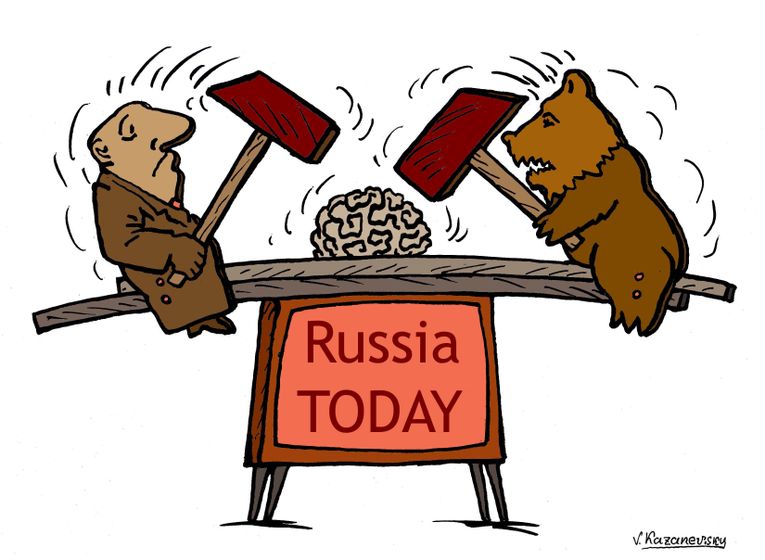Western governments, worried about Russia’s propaganda war against the West, often talk about blocking messages from the Kremlin; but they seldom focus on the extent to which people in countries targeted by the Kremlin turn into “willing participants” of this effort and do much of the work, according to Imbi Paju.
The Estonian writer and filmmaker’s observation, based on Finnish writer Sofi Oksanen’s remark that “Russia’s information warfare works because its targets are often willing participants,” draws on the way in which Soviet actions via local people intimidated others.
That phenomenon was called “’Finlandization,’” but in fact it was both more widespread than in that country and continues to this day in others where local elites oppose any criticism of Putin and his actions and thus chill local conversations more effectively than Russian propaganda alone. “This type of indirect pressure continues to claim victims today,” Paju says.
The distinguished Estonian writer says that she is personally “aware of how dangerous it can be to run afoul of Russian interests. In 2009, I edited a series of essays with Oksanen documenting official practices in Estonia when it was part of the Soviet Union. Our book, Fear was behind Everything, detailed the terror that gripped Estonia under the Soviet system.”
“For a half-century, any book that was critical of the communist regime was banned in the Baltic states and was not published in Finland, either. Our volume marked a turning point. Or so we thought.” But unfortunately, that has not proved to be the case. When she published a book about the Bronze soldier incident in Tallinn, a Finnish writer attacked it.
“His publisher was an Estonian-born journalist and former KGB officer, Vladimir Ilyasevich, who had worked in Finland and in other Nordic countries during the Cold War. Bäckman then trained his pro-Russian vitriol on me. First, he attacked a book I had written about my mother’s trauma in a Soviet gulag, and then organized protests against the release of Fear was Behind Everything.”
“Because of these threats, we requested armed police protection on the day of the book’s launch in 2009. And, while [the Finnish author] has since left his teaching job and directs most of his attention to spouting other pro-Putin falsehoods, the Russian-backed propaganda war he helped wage continues to affect my sense of security.”
“Simply put,” Paju says, “the old Soviet system of fear continues to wreak havoc on the truth and punish those who defend it on the page.” And this highlights something else:
“As the chief executive of the Estonian International Center for Defense and Security, Dmitri Teperik, recently argued, information wars are most dangerous for “civil activists” – like journalists, writers, and authors – because we are the ones on the front lines.”
“Nearly three decades after the fall of the Iron Curtain, Russia maintains its Soviet-era proclivity to prey on peoples’ fears and insecurities. Its operatives are happiest when their opponents cease their activities – when writers stop writing, or publishers stop publishing. Unfortunately, Russia succeeds more than it fails because it is easy to misinform.”
Like its Soviet predecessor, the current Russian regime is exploiting one of the features of Western societies against them: the commitment of the latter to freedom of speech. And that together with the willingness of all too many to collaborate with Moscow’s nefarious information campaigns makes fighting Moscow difficult.
But it is a fight that must be won – and the most important task now is to recognize how Moscow is achieving its victories, not just by its own efforts but by those who are all too prepared to work with it within their own societies. Such people often have far more influence than Moscow would on its own, and their lies need to be exposed first.
Read More:
- How Russia infiltrates the media landscape of the Black Sea region
- Unbalanced coverage most effective misinformation about Ukraine in the West – Andreas Umland
- French think tanks issue 50 recommendations to combat information manipulations
- What the UK, Sweden & Baltics did to be “full-scale defenders” against Kremlin subversion
- Baltic “elves” launch online database of pro-Russian trolls to tackle propaganda
- Internet, not TV, now Moscow’s main propaganda channel for Baltic countries, Lithuanian expert says
- Lithuania’s President: UN must rise up against Russia’s abuse or face irrelevance
- RT denied permission to open Latvian subsidiary
- Central and Eastern Europe in the fight with disinformation: How is Ukraine doing?
- Pro-Kremlin media to Baltic states: “nobody needs you”
- How big is Russia’s influence in Estonia?
- How Estonian Public Broadcasting creates an alternative to Russian propaganda
- In France, RT Is Getting No Love
- Kremlin has its favorite. “If it works out in France, the result will be unpredictable”
- UK, the Latest Target of Fake Russian Twitter Accounts
- French writer comments on France’s newest “useful idiot”
- Book details Kremlin’s influence networks in France
- Mariani’s visit to Crimea shame for France – French citizen
- RT channel’s assets seized in France
- Documents show French far-right’s involvement in war in Donbas
- Human rights for the Kremlin: sometimes a bogeyman, sometimes a friend on demand
- Russian propaganda in Montenegro, Sweden, and Finland – and how they’re fighting back
- A guide to Russian propaganda





